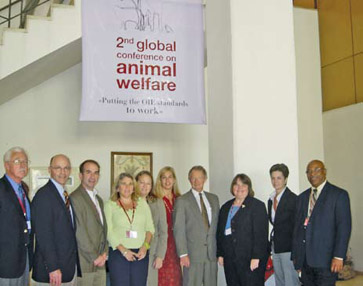Global conference aimed at implementing animal welfare standards

The AVMA CEO is encouraging veterinarians worldwide to take responsibility for implementing animal welfare standards.
"Veterinarians in all types of practice have the opportunity and obligation to help animal owners, caretakers, handlers, and policy makers improve animal welfare," Dr. W. Ron DeHaven said.
Dr. DeHaven delivered the comments at a global animal welfare conference Oct. 20-22 in Cairo, Egypt, where he was among more than 400 veterinarians, government officials, humane group representatives, and industry representatives who met to discuss animal welfare standards. He and Dr. Gail C. Golab, director of the AVMA Animal Welfare Division, actively participated in the event.
He is also encouraging veterinarians to back standards that are driven by science, with appropriate consideration given to the environments in which they are being implemented.
"Among the most important responsibilities that veterinarians have in development and implementation of animal welfare standards is to ensure those standards are science-based and that consideration has been given to interactions among the various components of animal care systems," Dr. DeHaven said.
The conference was the second global animal welfare meeting for the World Organization for Animal Health, the first having been held in 2004 in Paris. The recent meeting was primarily focused on implementing OIE standards in developing countries.
Dr. Bernard Vallat, director general of the World Organization for Animal Health (OIE), also said veterinarians, veterinary services, and their partners throughout the world need to take more responsibility for animal welfare and implementing humane animal care standards.
Dr. DeHaven was invited to present a paper on the veterinary profession's role in implementing OIE standards, and he emphasized in his presentation that there are no better advocates for animals than veterinarians. He also encouraged development and implementation of animal welfare standards that include considerations of human needs, environmental concerns, and economic realities.
In his presentation, Dr. DeHaven talked about the roles veterinarians could fill in implementing standards in developed and developing countries. In doing so, he invoked consideration of animals' physiologic, safety, and psychologic needs.
Veterinarians in developing countries often have limited resources and encounter human needs that compete with animal welfare concerns for attention, Dr. DeHaven said. "They will likely spend most of their time helping owners find ways to fulfill animals' physiological and safety needs, since meeting these needs generally provides the greatest return on investment in terms of quality and quantity of animal product."
He encouraged veterinarians practicing in developed countries where resources are more plentiful to look beyond basic needs to satisfy animals' more complex safety and psychologic needs. Dr. DeHaven said veterinarians have a professional obligation to comprehensively evaluate approaches to animal care, use their expertise and influence to maximize all aspects of the animals' welfare, and help people understand the complexity of animal care decisions.
The conference theme was "Putting the OIE Standards to Work," and attendees reviewed the state of implementation of standards for transporting livestock, slaughtering animals for human consumption, and killing animals to control disease.
Dr. Nestor Tadich, dean of the Faculty of Veterinary Science at Universidad Austral de Chile, said Columbia, Mexico, Paraguay, and Uruguay have legislation based on OIE standards, and Chile is introducing OIE recommendations on animal welfare and producing guides on good practices for farmers and veterinarians.
Among 22 veterinary schools in Latin America that provided answers to a questionnaire, four have only optional animal welfare courses, 10 have only compulsory courses, one has one of each, and seven have none, Dr. Tadich said. Of those that have such courses, five have more than one.
The universities polled are located in Argentina, Bolivia, Brazil, Chile, Columbia, Ecuador, Guatemala, Mexico, Peru, Salvador, Uruguay, and Venezuela.
Respondents at 18 of the veterinary schools indicated animal welfare is taught in other courses, Dr. Tadich said. Respondents at 19 said animal welfare is an important issue, and 12 indicated their schools conduct research in animal welfare.
Dr. Tadich said in his presentation that constraints or limitations in Latin American universities include a dearth of staff trained in animal welfare concepts, overloaded curricula, lack of support for research, lack of research for postgraduate programs, cultural traditions such as bullfighting, poverty, lack of legislation supporting animal welfare recommendations, lack of public awareness, and distrust toward people encouraging observance of animal welfare standards.
Dr. Nils Beaumond of the Animal Welfare Committee of the International Meat Secretariat advocated against animal welfare labeling on meat products, which he said could present a new trade barrier. He argued in his presentation that the focus should be on outcomes, not means.
Dr. Beaumond said demands from provegetarian and extremist groups surpass animal welfare requirements, and collaboration with the extremist groups is impossible.
Dr. Peter Thornber, manager of Australian Animal Welfare Strategy and Communications, talked about how planning and management can be used to mitigate stress for animals during transportation. He said farmers, agents, drivers, and shippers have to share responsibility, and appropriate vehicle design, trained drivers, travel plans, and prepared animals are needed.
Research and data analysis can help in creation of practical standards, Dr. Thornber said.
Dr. Thornber said indications of acceptable welfare include animals that are free of visible injuries or postslaughter evidence of carcass bruising, animals that walk up loading ramps with minimal intervention, animals are deemed fit before loading, and animals that can walk off vehicles unaided.